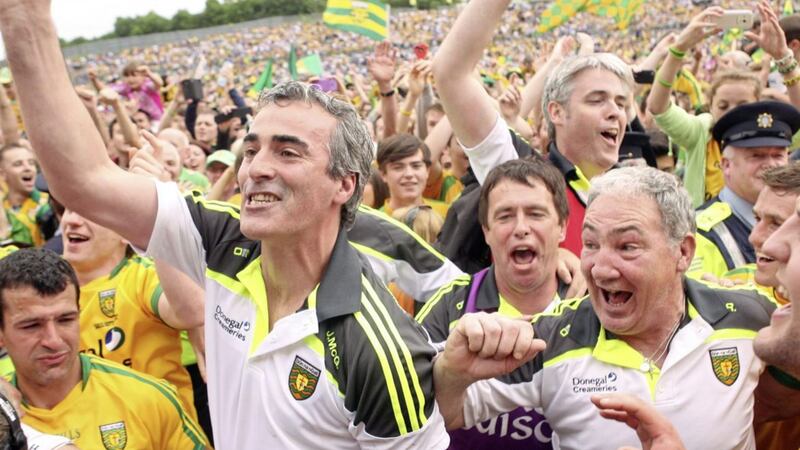NOWADAYS you probably fit into two schools of thought. The first is the practical way of thinking. The second is that of the romantic.
When Jim McGuinness took over as Donegal manager, he inherited a general bunch of party-loving misfits who could pull off the odd good result but consistently failed to deliver, especially against more limited opposition.
He obviously saw something in the club scene that made him believe that the footballers of Donegal had talent but lacked direction.
He set about changing that early on, targeting an Ulster title first.
He knew that winning this would be provide a platform for future success.
To do this, he did what he had to do. He pulled 14 and 15 men behind the ball.
He tactically won Donegal the Ulster Championship in 2011 and was every bit as important as
Karl Lacey was, for example.
This broke Tyrone’s domination of Ulster. McGuinness gave the players the confidence that it could be done.
Again, in a quarter-final in the same year – probably one of the worst I’ve ever watched – a
last-gasp Kevin Cassidy point nicked a win and Dublin lay in wait in the semi-finals.
Let us not forget that Donegal did what it took to win, metaphorically and tactically.
The genius of McGuinness was that he realised in 2011 that, to beat Dublin, they were going to have to be more expansive. You lay the foundations and then you build the house.
He out-thought the opposition before a ball was kicked and he concentrated on ensuring that his team was both prepared and regimented in how they played.
It may have been awful or ugly to watch, but needs must.
Indeed Donegal delivered another Ulster title the following year and an All-Ireland to boot.
Would I have loved to play that type of game [Donegal’s]? I am
a purist, but if it got me an
Anglo-Celt and an All-Ireland medal then yes, without any doubt, I would have done anything.
The practical manager or coach will do what it takes to win; the problems start to manifest themselves when you try to mimic a playing style and do not win as a result. You neither win nor do you enjoy playing the game.
Whether you can lose and enjoy is another question, but the romantic in me would say that if you give it a real good lash and are still beaten, all is fair in love and war.
The romantic idea that you can go 15 against 15 and simply outplay opposition nowadays is just that – a romantic idea.
It is a bit like the idea that every Friday I do the Lotto almost sure I will never win... but then again there is always that chance.
A tactic that once started as one player coming straight back and sitting in front of the full-back and behind the centre half-back has now become two sweepers. It is a case of a midfielder also coming back and sitting in front of the
full-back.
A half-forward will play most of the game on his own 45 and not in the opposition’s. Then he will probably handle more ball than anyone else.
Half-backs are the same. Look at Ryan McHugh. Twenty years ago he would have been a corner-forward, if that, probably even considered too small to play
inter-county football. Now, he is a vital cog in the Donegal machine, playing at wing-back. He scores more than the Donegal
half-forward line combined in many cases.
It is interesting that the role of sweeper has changed significantly since 2012 too. Mark McHugh made himself indispensable within that particular team He now makes substitute appearances as it appears that particular role is no longer as clear as it once was.
Colm Cavanagh (inset) has provided the Tyrone cover for the last few years, something introduced by Dublin, only via a centre half-back in Cian O’Sullivan.
I recall watching Dublin from 2008 right through until 2011 when they won an All-Ireland. After taking a couple of heavy beatings in quarter-finals, Pat Gilroy eventually concluded that the romance of Dublin had to give way to the practicalities of modern day Gaelic football.
His six defenders rarely marauded forward and set up as six defenders playing in a very structured and rigid defensive system.
If you wondered why Dublin only beat Donegal by two points in the 2011 semi-finals (8-6), it is because Gilroy was not going to allow Dublin to be sucked up the field and be caught by a highly organised Donegal team.
On the day, Dublin with the better footballers won the game. However, the romantic Jim Gavin would pay the price in 2013, leaving himself wide open for Donegal’s ambush.
This was a mistake Gavin would not make again. Gilroy and Gavin both learned from the numerous hidings and defeats Dublin took at the various stages of the Championship since 1995 that romance had to be sacrificed for the practicalities of the game.
McGuinness learned this in 2010.
Eamon Fitzmaurice in Kerry knew this in 2013. He didn’t care how aesthetically pleasing the ‘great’ Kerry team was. They needed an All-Ireland by whatever means and he delivered one tactically.
He played Donegal at their own game in 2013 and relied on mistakes Donegal made to fall over the line.
I never thought it was tactical genius. It was simply being smart and taking a traditional mentality and way of playing, throwing it in the bin and moving in with a practical mentality and a needs must approach.
Mayo almost did it last year against Dublin. They took Dublin’s model and basically copied it.
They only lacked the creativity up front to win them the game, something that has not changed in the last 20 years.
Club football is moving in the same direction. However, teams are not as willing to buy into the workmanlike tactics and, at times, a frustrating way of playing.
A lot of the reason why lies in the enjoyment factor. It just isn’t nice to play and when you are struggling to get 15 footballers onto the field for some clubs, the enjoyment factor may be the only option available to you.
Romance is dead.







